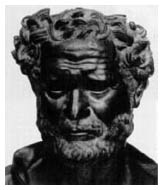Heraclitus
|
|
Heraclitus of Ephesus (Greek Template:Polytonic Herakleitos) (about 535 - 475 BC), known as 'The Obscure,' was a pre-Socratic Greek philosopher. He disagreed with Thales, Anaximander, and Pythagoras about the nature of the ultimate substance and claimed instead that everything is derived from the Greek classical element fire, rather than from air, water, or earth. This led to the belief that change is real, and stability illusory. For Heraclitus everything is "in flux", as exemplified in his famous aphorism "Panta Rhei":
Template:Polytonic
Everything flows, nothing stands still
He is famous for saying: "No man can cross the same river twice, because neither the man nor the river are the same." The idea of the logos is also credited to him, as he believes everything originates out of the logos. Further, Heraclitus said "I am as I am not", and "He who hears not me but the logos will say: All is one."
Heraclitus' view that an explanation of change was foundational to any theory of nature was strongly opposed by Parmenides, who argued that change is an illusion and that everything is fundamentally static. Heidegger, in his Introduction to Metaphysics compels us to look beyond this difference, and become sensitive to the common foundation of these two thinkers, an originary experience of Being, i.e. logos.
Only fragments of Heraclitus' writings have been found. He appears to have taught by means of small, oracular aphorisms meant to encourage thinking based on natural law and reason. The brevity and elliptical logic of his aphorisms earned Heraclitus the epithet 'Obscure'.
Heraclitus is described as having a melancholy disposition, and is sometimes referred to as the "weeping philosopher," as opposed to Democritus, who is known as the "laughing philospher."
External links
- Heraclitus (http://www.utm.edu/research/iep/h/heraclit.htm) at the Internet Encyclopedia of Philosophy
- Heraclitus (http://www.wsu.edu/~dee/GREECE/HERAC.HTM) at Washington State University
- The Flux and Fire Philosophy of Heraclitus (http://www.thebigview.com/greeks/heraclitus.html)
- Fragments of Heraclitus (http://philoctetes.free.fr/heraclitus.htm)
- John Burnet Early Greek Philosophy: brief analysis; the fragments (http://plato.evansville.edu/public/burnet/ch3a.htm)
| This article is part of The Presocratic Philosophers series |
| Thales | Anaximander | Anaximenes of Miletus | Pythagoras | Philolaus | Archytas | Empedocles | Heraclitus | Parmenides | Zeno of Elea | Melissus of Samos | Xenophanes | Anaxagoras | Leucippus | Democritus | Protagoras | Gorgias | Prodicus | Hippias | Pherecydes |
cs:Hérakleitos de:Heraklit es:Heráclito de Éfeso fi:Herakleitos fr:Héraclite he:הרקליטוס id:Herakleitos it:Eraclito ja:ヘラクレイトス la:Heraclitus nl:Heraclitus pl:Heraklit pt:Heráclito de Éfeso ro:Heraclit ru:Гераклит Эфесский sl:Heraklit Mračni zh:赫拉克利特

